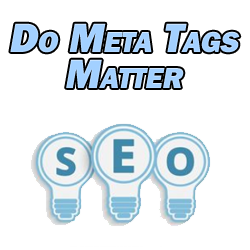Online marketers have long contested the importance of meta tags in regards to the weight which search engines assign to them. The truth is that these are just a few of the various search engines’ many, many algorithmic ranking factors. This brings us to today’s topic: do meta tags matter?
Do Meta Tags Matter
Remember that no one knows for certain how much or little weight search engines place on anything to figure out where to rank a website. Let me say that one more time to really drive home how important that sentence is: NO ONE knows for certain how much or little weight search engines place on anything to figure and construct their rankings.
SEO aside, each meta tag still has its place, so make sure you use a plugin or module to give you control over what appears in your meta tags. Now let’s go over the major meta tags right now and remind you of each of their roles.
Title – The title tag is important as this is what appears in the SERPs as the potential title of your search engine listing. A catchy title will get people to click through, and we do know that a healthy click through rate is important for boosting your ranking. Possible SEO consideration aside, you should also tie in your main keyword here if for no other reason than to show how your title relates to the content of that page.
Description – Similar to the title, the meta description which you include appears in the SERPs as the description just below the title. This is where you expound on your title to give people a better idea of what you can expect in the content of that page if you click through. Do not leave the description up to chance. Think about weaving in your keyword once for relevancy again.
Heading – The heading tag likely doesn’t have as much of an effect on SEO like most meta tags as they used to as the search engines become more sophisticated at recognizing the content of a page from the text itself. While the H1, H2 and so on tags still can tip search engines off to the content of a page, they’re still useful for one of their main their initial purposes which was organizing your content in terms of emphasis and importance.
Keywords – Matt Cutts has gone on record saying that Google doesn’t even look at the keyword tags. This is a good example to remind you that you can’t implicitly trust anything a search engine spokesperson tells you regarding their algorithm whether positive or negative. They have an interest in keeping webmasters in the dark about what goes into their algorithm in order to keep webmasters from trying to game the system.
While I can’t say whether using the keywords tag will help or hurt your ranking chances, the general consensus seems to be that so long as you keep your keywords short and sweet and most importantly relevant, not going overboard and stuffing the box with too many options, you should be all right.
